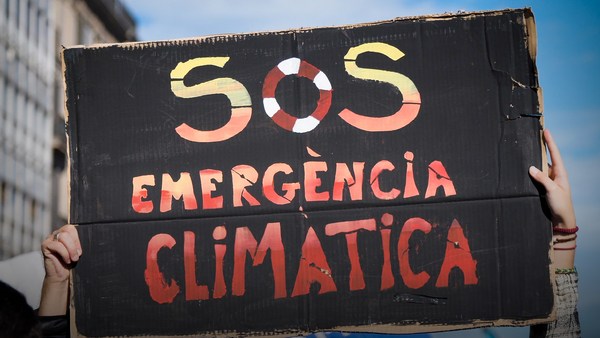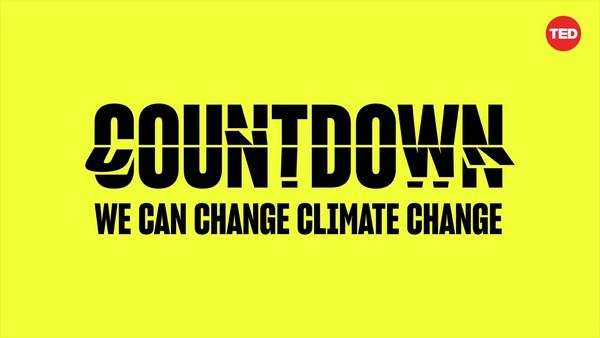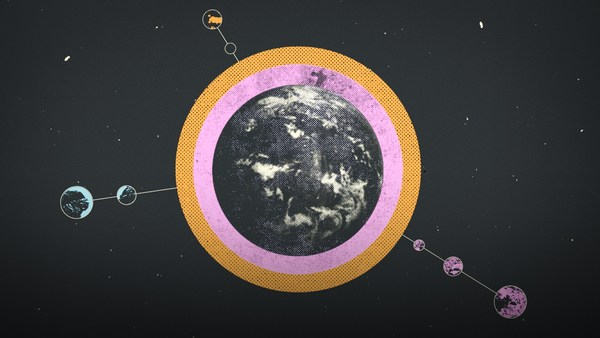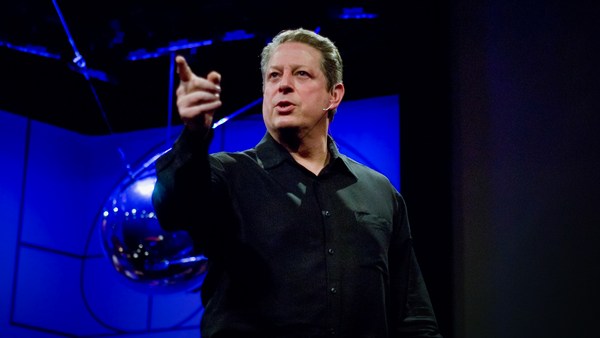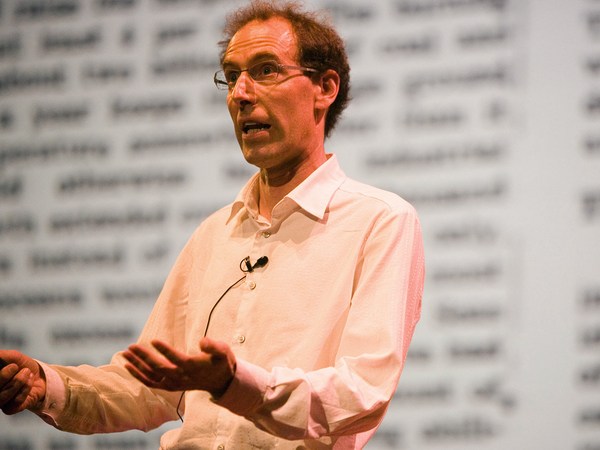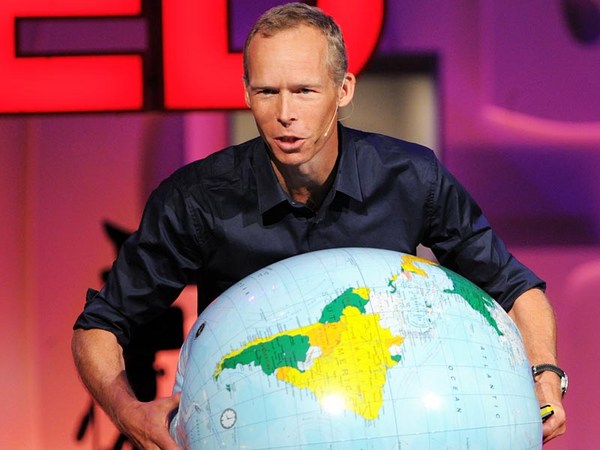So the climate crisis, in my way of thinking about it, is the most serious manifestation of an underlying collision between human civilization as we’ve presently organized it and the Earth's ecological systems. And the system most in jeopardy is the very thin shell of atmosphere surrounding our planet, because we're spewing 162 million tons of human-caused global warming pollution into it every single day, as if this is an open sewer. It's not an open sewer. It's so thin that if you could drive an automobile at autobahn speeds to the top of that blue shell, you'd reach it in about five minutes. And that's where all the greenhouse gases are. The accumulated amount, coming from the burning of fossil fuels primarily, CO2 -- fastest-growing source of methane is from fossil fuels as well, also, agriculture as you have heard -- the accumulated amount traps as much heat now as would be released by 600,000 Hiroshima-class atomic bombs exploding every day.
So the temperatures are going up at almost record levels every year. Last year was the hottest year in recorded history, according to NASA, and the scientists say it’s absolutely unequivocal that we are the cause of that. And we’re hearing Mother Nature and seeing the extreme events. The most anomalous extreme event since records began 200 years ago was in the Pacific Northwest of North America. Forty nine and a half degrees, 121 degrees Fahrenheit in British Columbia. In the tropics and subtropics, the combination of temperature and humidity is now making larger areas literally uninhabitable, the area so described is relatively small now, but if we continue over the next few decades, these areas are predicted to expand, and billions of people will be in areas where it is not safe to stay outside for more than a couple of hours.
Already, the climate refugees and migrants are four times more from the climate crisis than from all the wars and conflicts going on right now. And the respected “Lancet” commission has predicted as many as a billion climate refugees in this century. That's one of the reasons why we are seeing this wave of populist authoritarianism.
Sea level rise is also contributing, and of course, 93 percent of the extra heat is absorbed in the oceans, and the ocean temperatures are reaching record levels as well. And that means more water vapor comes off the oceans, and the warmer ocean temperature makes the cyclonic storms, like hurricanes and typhoons much stronger. Hurricane Ida struck the Gulf Coast as a category four, and as is so often the case, communities of color and poor people were disproportionately victimized. This storm continued on north and northeast across North America to New York, New Jersey and Pennsylvania, killed a lot of people and dropped rain bombs. And in New York City some basement apartments were flooded.
And I appreciate this family giving me the right to show this video.
(Screams)
He’s safe, the guy is screaming for his mother. He and his mother were both rescued by his brother, who punched a hole through the roof from the floor above.
These rain bombs are becoming much more frequent and much more extreme. And actually the water coming off the oceans is held in much greater volumes by the warmer air. Atmospheric rivers are becoming larger. Here's one, from Hawaii in the lower left to Silicon Valley in the upper right, 2,300 kilometers. What was happening in Silicon Valley when this satellite picture was made? Well, that's what happens when these rain bombs drop, and the average atmospheric river now contains as much moisture as 25 Mississippi Rivers. They’re creating what you could call “atmospheric tsunamis” in some areas.
The downpours get much bigger and much more frequent, four times more frequent now than in 1980. One of them dropped on Germany and neighboring countries in July, killed more than 200 people. Look at the before and after. This is an example of what we're doing to our planet. Ten days ago, in part of Italy, there were 74 centimeters that fell in 12 hours, 29 inches of rain in 12 hours. One year ago, October 3rd, as much rain fell here in the UK as there is water in Loch Ness. And as a result, the insurance industry is now seeing record recoveries, and those recoveries I showed you from last year may get a tiny bit larger, depending on the outcome of this lawsuit. The owners and operators of this giant replica of Noah's Ark have sued their insurance company for a million dollars in flood damages. Hard to make some of this stuff up.
(Laughter)
The same extra heat is pulling the moisture out of the first meter of the soil, creating the worst droughts in memory. 93 percent of the American West is in drought now, 100 percent of California, half of California is in the most extreme form of drought, and the same heat is also draining the reservoirs, evaporating the reservoirs. Lake Mead is down to levels not seen since they started filling it in the 1930s. In Brazil, the same thing is happening. In Eastern Europe, the Czech Republic has been going through the worst drought in at least 500 years. And in the southern cone of Africa, 100 million people are experiencing food insecurity primarily because of the extended droughts.
And when the temperatures go up, the fires get a lot worse and the worst fires in California and western US history have been in the last two years. Also in Siberia, in Australia, in southern Europe. It doesn’t have to ruin your golf game. And this is a serious point, because we can't let these conditions become the new normal. It's not fine. And this is an example of why it's not fine. A lightning strike hitting a natural gas leak in the middle of the Gulf of Mexico. Lightning gets more common with the climate crisis. We're relying on dead plants and animals, leaving their residue in the atmosphere to threaten the species that are still alive, and 50 percent of them are in danger of extinction in this century. And as we push into previously wild areas of the world, we encounter millions of new viruses that we have not dealt with in the past. Five new infectious diseases every year, emerging, three quarters of them from animals, like the COVID-19 pandemic. Which raises some of the same questions that are raised by the climate crisis. When the world’s leading scientists are setting their hair on fire to get our attention, should we listen to them? Check. Can our interconnected global civilization suddenly be turned upside down? Check. Are the poor and marginalized populations of the world the most affected? Check. Can science and technology give us nearly miraculous solutions in record time? Check. Will we deploy those solutions in time? That is the question.
We have inequitable vaccine distribution in the world, and it threatens everyone in the world. We also have solutions to the climate crisis, but they're not equitably distributed. Worldwide, 90 percent of all of the new electricity generation installed last year was renewables. Almost all of it from solar and wind. Just one year before the Paris Agreement, solar and wind electricity was cheaper than fossil electricity in only one percent of the world. Five years later, two thirds of the world. Three years from now, it will be the cheapest source in 100 percent of the world. Coal is not getting cheaper. Gas is not getting cheaper. Nuclear has been getting more expensive. Wind is cheaper than all three, and solar is continuing to plummet in cost and is the cheapest of all now because the cost of making the solar panels and the windmills continues to come down. By the way, the famous coal museum in Kentucky just installed solar panels on its roof in order to save in its operating budget.
(Applause)
Now we're getting battery storage. I’ll rescale this graph to show you the predicted emergence of a new one-trillion-dollar industry in the next few decades and green hydrogen on top of that. The car batteries are getting cheaper as demand continues to increase. And within less than two years in some model categories, the EVs will be cheaper than their internal combustion engine counterparts and within four years in all model categories.
So, the oil and gas industry has been the worst investment in global markets for more than a decade, while the clean energy companies are really becoming more profitable. Now the oil and gas companies say that they're going to invest a lot more in renewables and CCS. Yes, it’s the fastest-growing -- they’ve tripled their investments all the way up to four percent. Ninety-six percent of the money they’re spending is still going into oil and gas and coal.
(Applause)
The impression they've given us is not an honest impression, not for the first time. And they're telling a different story to Wall Street. They still have planes, trains, a few automobiles and ships, but they're telling Wall Street and financial markets they're going to make it up in plastics, which is 75 percent of their third-largest market, petrochemicals. How's that working out for us? Not so well. Banning single-use plastics is one of the many things that we have to do.
We have to shift to sustainability. And here's the good news, the sustainability revolution is the single biggest business opportunity in the history of the world. It has the scale of the industrial revolution coupled with the speed of the digital revolution. And what we're seeing is that we have to seize this opportunity, but we need reforms in the current version of capitalism.
Capitalism does a lot of things great. It balances supply and demand and allocates resources efficiently and often unlocks a higher fraction of the human potential. And by the way, the alternatives on the left and right explored in the 20th century didn't work out very well. But in order to see how we need to change capitalism, we have to pull out our focus. And let me present an analogy. The electromagnetic spectrum from the long radio waves to the short gamma rays and all the things in between, the portion of visible light that we can see with our eyes makes up only 0.1 percent of the total. For the eight years I worked in the White House, I got a daily report from the intelligence community that collected from all parts of the spectrum, and it was a much more accurate picture. Here's the analogy. The value spectrum is something we too frequently look at through the very narrow aperture of short-term profits for one stakeholder, the shareholders. But this leaves out negative externalities, as the economists call them, like the pollution. That's why we need a price on carbon and a price on plastic pollution. It also leaves out positive externalities. So we’re chronically underinvesting in education and health care and environmental protection, pandemic preparedness. We're ignoring the depletion of resources like topsoil and underground water aquifers. And we’re ignoring the distribution of incomes and net worths to the point where one percent of the people have almost half of the world's wealth. That's one of the other factors that's driving populist authoritarianism. We have to take account of the environmental effects and the effects on people and their families and the communities where they live and the communities in their supply chain and the ethics in the C-suites. And we have to realize that hyper inequality is a threat to both capitalism and to democracy.
There is an emergent form called multistakeholder capitalism, and it is driving a lot of new decisions. For example, in asset management, almost half of all the assets in the world under management are now in portfolios committed to net-zero. One reason is that the Paris Agreement set the direction of travel, where every country in the world committed to net-zero.
So just last May, the G7 nations banned financing of coal plants overseas. And just three weeks ago, China did, which is good, because they were financing most of them. I hope that they will cut down on the coal chain in China domestically as well. And now more than half of all the greenhouse gas emissions and two thirds of global GDP is coming from countries that have set net-zero targets.
So here's the hope. Once we reach net-zero, then with a lag time of as little as three to five years, the temperatures in the world will stop going up. And once we reach net-zero within as little as 25 to 30 years, half of the human-caused CO2 will fall out of the atmosphere.
It is as if we have a switch that we can flip in order to stop the climate crisis. Regrettably, some damage has been done, but we can stop the temperatures from going up and start the healing process. But we all have to flip this switch known as reaching net-zero.
The young people are telling us that we have to, and they're marching in every country in the world. And what's the response? As recently as this morning we heard, "Well, it may be impossible." Well, it's not impossible. Nelson Mandela said, “It always seems impossible until it’s done.” That's what they told the abolitionists. "It's impossible to eliminate slavery." That's what they told the women's suffragettes. "It's impossible to have equal rights for women." In the civil rights movement in my country and the anti-apartheid movement in South Africa and more recently, the lesbian and gay liberation and equal rights movement.
We can do this. This is the biggest emergent social movement in all of history. We can do this. And if anybody thinks that we don't have the political will, remember, political will is itself a renewable resource.
Thank you very much.
(Cheers and applause) Thank you.
